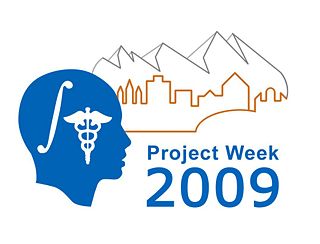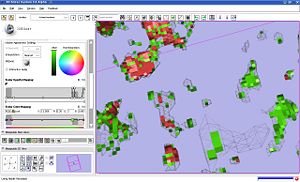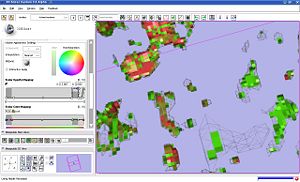Difference between revisions of "2009 Winter Project Week ChangeTracker"
| Line 54: | Line 54: | ||
{| | {| | ||
| − | [[Image:transfer_function1.jpg]]| | + | [[Image:transfer_function1.jpg|thumb|300px]]| |
| − | [[Image:transfer_function2.jpg]]| | + | [[Image:transfer_function2.jpg|thumb|300px]]| |
|} | |} | ||
Revision as of 20:33, 8 January 2009
Home < 2009 Winter Project Week ChangeTracker Return to Project Week Main Page |
Key Investigators
- Andriy Fedorov, SPL
- Jim Miller, GE
- Karthik Krishnan, Kitware
- Marcel Prastawa, SCI
- Wendy Plesniak, SPL
- Luis Ibanez, Kitware
Objective
ChangeTracker is a software tool for quantification of the subtle changes in pathology. The module provides a workflow pipeline that combines user input with the medical data. As a result we provide quantitative volumetric measurements of growth/shrinkage together with the volume rendering of the tumor and color-coded visualization of the tumor growth/shrinkage.
The objective at this meeting is to determine the status of the Slicer3 components needed for enhanced functionality of ChangeTracker, identify new uses of ChangeTracker, and propose the tentative roadmap for ChangeTracker evolution for the next 6 months.
Approach, Plan
We consider the following improvements to ChangeTracker:
- Extending the interface to allow analysis of more than two images
- Volume rendering of tumor segmentation: visualization and 3d widget for volume cropping
- Using Lightbox for tumor progression visualization
- Robustness of initial tumor segmentation. Currently, we use user-guided thresholding. It must be quick, with minimum input from the user. Discuss possible approaches with Marcel, other groups in tumor segmentation research.
- Consider error handling interface issues in execution of an external module (how to properly handle registration errors?)
Progress
Volume rendering of label data
We investigated the behavior of volume rendering on the sample data from tumor growth analysis. We identified that it is crucial to use nearest neighbor interpolation for label volume rendering. It appears that the behavior of the opacity mapping function is rather unexplained (see the screenshots):
- although the input label map contains only three intensity values (background 0, shrinking 12 and growth 14), the cut-off location of the opacity mapping for the shrinking label affects rendering
- the results of volume rendering are drastically different from the surface recovered with marching cubes (see the screenshots)
The datasets for testing are available here, and the transfer function can be seen on the screenshots.
Relevant projects of interest
- Longitudinal lesion analysis
- 3d widgets
- Volume rendering
- Command line program testing
- Lesion sizing toolkit
References
- E.Konukoglu, W.M.Wells, S.Novellas, N.Ayache, R.Kikinis, P.M.Black, K.M.Pohl. Monitoring Slowly Evolving Tumors. Proc. of 5th IEEE International Symposium on Biomedical Imaging: From Nano to Macro 2008, pp.812-815 link

